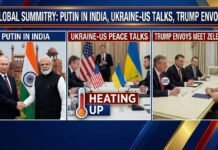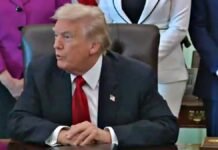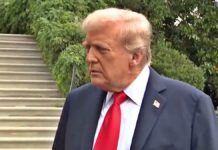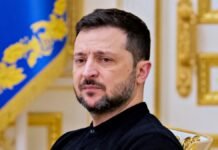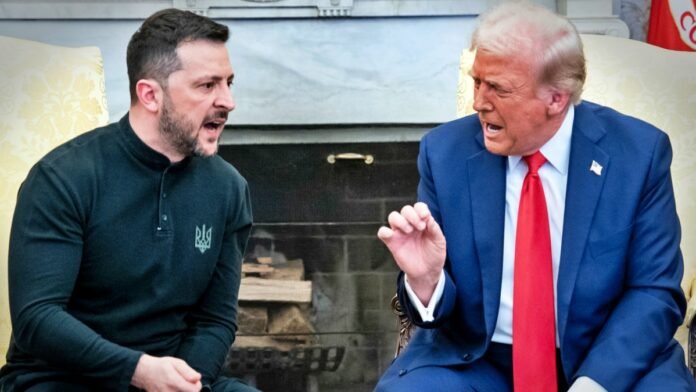
Key Points:
- Multiple contentious meetings have occurred between President Trump and Ukrainian President Zelenskyy throughout 2025
- The most explosive confrontation happened on February 28, 2025, not recently, which escalated into a public shouting match in the Oval Office
- Trump has denied Ukraine Tomahawk missiles following an October 17, 2025, meeting at the White House
- Russia has proposed ceasefire terms demanding Ukraine cede Donbas region, which Ukraine has flatly rejected
- The US temporarily suspended military and intelligence aid to Ukraine for one week in March 2025 before resuming support
Washington: US President Donald Trump has repeatedly pressured Ukrainian President Volodymyr Zelenskyy to make territorial concessions to Russia during multiple White House meetings throughout 2025. According to recent reports from the Financial Times and Reuters, Trump has suggested that Ukraine should “stop where they are” and negotiate a settlement with Moscow.
During discussions aboard Air Force One on October 20, Trump suggested that the Donbas region in Ukraine should be “cut up” with most territory remaining under Russia’s control. The president has called on both sides to halt fighting at current positions, despite Ukraine controlling approximately 6,600 square kilometers in Donbas while Russia occupies around 440 square kilometers in the Sumy and Kharkiv regions.
February 2025 Oval Office Confrontation
The most dramatic confrontation between the two leaders occurred on February 28, 2025, when a televised bilateral meeting in the Oval Office escalated into an unprecedented public shouting match. Vice President JD Vance accused Zelenskyy of being “disrespectful” and “ungrateful” for American support, demanding the Ukrainian president “say thank you”.
Trump told Zelenskyy during that heated exchange: “You’re gambling with millions of lives, you are gambling with World War Three”. The meeting ended abruptly without the planned signing of a minerals agreement, and Zelenskyy was asked to leave the White House.
Tomahawk Missile Decision
Following the October 17, 2025 White House meeting, Trump denied Ukraine’s request for long-range Tomahawk cruise missiles. While Trump had previously indicated he might supply these weapons if Russia refused to negotiate, he ultimately decided against the transfer after the two-hour discussion with Zelenskyy.
Zelenskyy had expressed optimism that Tomahawk missiles could play a pivotal role in ending Russian aggression, stating: “We observe that Russia is apprehensive about the possibility of the Americans supplying us with Tomahawks—this pressure could facilitate peace”. However, Trump warned that providing such weapons “could mean bigger escalation” in the war.
Russia’s Ceasefire Proposal Rejected
Russian President Vladimir Putin has presented a ceasefire proposal that demands Ukraine completely withdraw from the Donetsk and Luhansk regions in exchange for Russia stabilizing front lines in southern portions of Kherson and Zaporizhzhia. Putin’s offer explicitly rules out a ceasefire until a comprehensive deal is reached, blocking a key demand from Zelenskyy.
Ukraine has categorically rejected this proposal, maintaining that the country’s sovereignty and territorial integrity cannot be compromised. The Russian proposal also seeks formal acknowledgment of Russian sovereignty over Crimea, which was annexed from Ukraine in 2014.
Temporary Aid Suspension
In the aftermath of the February confrontation, the Trump administration suspended military aid and intelligence provision to Ukraine for approximately one week in early March 2025. The aid was resumed on March 11, 2025, after Zelenskyy agreed to an unconditional 30-day ceasefire proposal, contingent on Russian approval. However, the ceasefire did not materialize as Russia rejected the proposal.
International Reaction
The contentious meetings between Trump and Zelenskyy have drawn widespread international attention and criticism. Nearly all US allies voiced support for Zelenskyy following the February confrontation, with many issuing statements that appeared to rebuke Trump’s confrontational approach. French President Emmanuel Macron notably stated: “If anyone is gambling with World War III, his name is Vladimir Putin”.
A March 2025 YouGov poll found that 51% of Americans felt Trump was disrespectful toward Zelenskyy, while 32% felt Zelenskyy was disrespectful toward Trump. The meetings have highlighted deep divisions within American politics regarding continued support for Ukraine in its defense against Russian aggression.




































